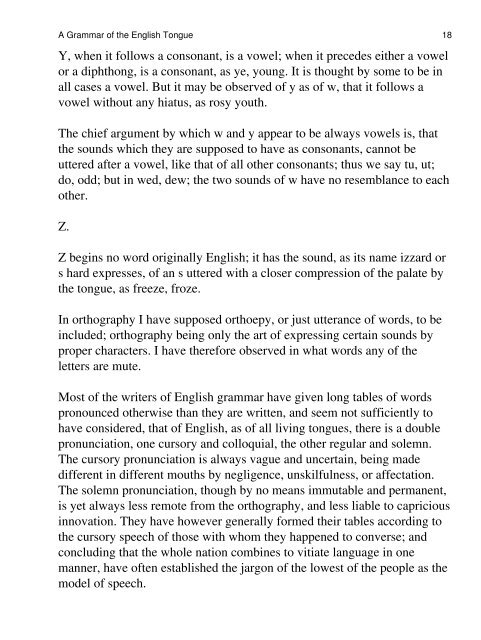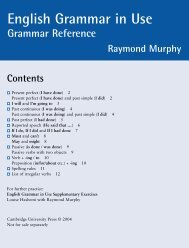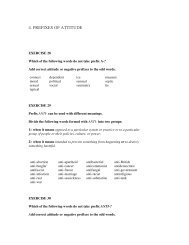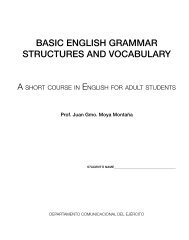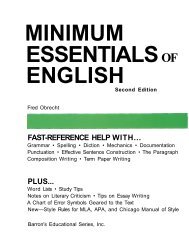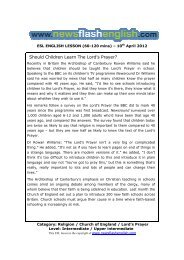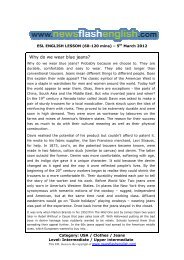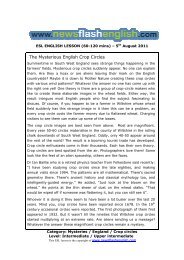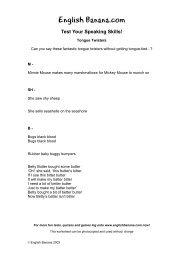A Grammar of the English Tongue - ESL Teachers Board
A Grammar of the English Tongue - ESL Teachers Board
A Grammar of the English Tongue - ESL Teachers Board
You also want an ePaper? Increase the reach of your titles
YUMPU automatically turns print PDFs into web optimized ePapers that Google loves.
A <strong>Grammar</strong> <strong>of</strong> <strong>the</strong> <strong>English</strong> <strong>Tongue</strong> 18Y, when it follows a consonant, is a vowel; when it precedes ei<strong>the</strong>r a vowelor a diphthong, is a consonant, as ye, young. It is thought by some to be inall cases a vowel. But it may be observed <strong>of</strong> y as <strong>of</strong> w, that it follows avowel without any hiatus, as rosy youth.The chief argument by which w and y appear to be always vowels is, that<strong>the</strong> sounds which <strong>the</strong>y are supposed to have as consonants, cannot beuttered after a vowel, like that <strong>of</strong> all o<strong>the</strong>r consonants; thus we say tu, ut;do, odd; but in wed, dew; <strong>the</strong> two sounds <strong>of</strong> w have no resemblance to eacho<strong>the</strong>r.Z.Z begins no word originally <strong>English</strong>; it has <strong>the</strong> sound, as its name izzard ors hard expresses, <strong>of</strong> an s uttered with a closer compression <strong>of</strong> <strong>the</strong> palate by<strong>the</strong> tongue, as freeze, froze.In orthography I have supposed orthoepy, or just utterance <strong>of</strong> words, to beincluded; orthography being only <strong>the</strong> art <strong>of</strong> expressing certain sounds byproper characters. I have <strong>the</strong>refore observed in what words any <strong>of</strong> <strong>the</strong>letters are mute.Most <strong>of</strong> <strong>the</strong> writers <strong>of</strong> <strong>English</strong> grammar have given long tables <strong>of</strong> wordspronounced o<strong>the</strong>rwise than <strong>the</strong>y are written, and seem not sufficiently tohave considered, that <strong>of</strong> <strong>English</strong>, as <strong>of</strong> all living tongues, <strong>the</strong>re is a doublepronunciation, one cursory and colloquial, <strong>the</strong> o<strong>the</strong>r regular and solemn.The cursory pronunciation is always vague and uncertain, being madedifferent in different mouths by negligence, unskilfulness, or affectation.The solemn pronunciation, though by no means immutable and permanent,is yet always less remote from <strong>the</strong> orthography, and less liable to capriciousinnovation. They have however generally formed <strong>the</strong>ir tables according to<strong>the</strong> cursory speech <strong>of</strong> those with whom <strong>the</strong>y happened to converse; andconcluding that <strong>the</strong> whole nation combines to vitiate language in onemanner, have <strong>of</strong>ten established <strong>the</strong> jargon <strong>of</strong> <strong>the</strong> lowest <strong>of</strong> <strong>the</strong> people as <strong>the</strong>model <strong>of</strong> speech.


